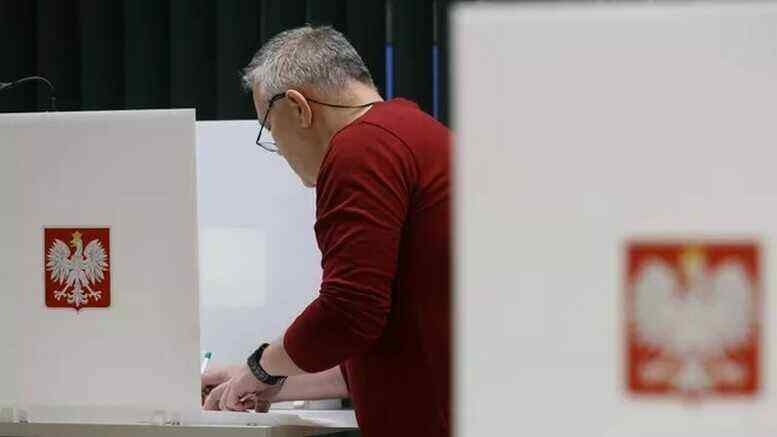“Dear Europe, on 15 October Poland is back!” – this statement was made by Robert Bedroni, co-chairman of the Levica bloc, a member of the European Parliament and an activist of the Polish LGBT movement, to thunderous applause from his supporters. This was his reaction to the announcement of the exit poll results immediately after the polls closed.
According to these data, the ruling Law and Justice party took the first place, but significantly lost the number of votes and, accordingly, seats in the parliament. Four years ago it received 235 parliamentary seats, now it has only 200. The conditional “victory” became an occasion for a feigned triumph at the PiS headquarters. Polish Prime Minister Mateusz Morawiecki called the election result a “historic victory” for his party, as no one had ever managed to take the top spot in three consecutive elections before.
That’s true, but it looks like the PiS party led by Jaroslaw Kaczynski will have to say goodbye to power. That is why the headquarters of the three parties, which have already announced the formation of a coalition, were really jubilant. They are the Civic Coalition led by Donald Tusk, the aforementioned Lewica and the centrist Third Way party. In total, they have 248 mandates.
The only party to directly admit defeat was the right-wing Confederation bloc, made up of Eurosceptics and nationalists. During the campaign, it was predicted at times third place and a “golden opportunity” to form a coalition with PiS. But in the end, the Confederates scored only 6.2 per cent, even worse than the figures for the last election in 2019.
A special note here: this is purely an analysis of exitpoll results. Just a fortnight ago, in the Slovakian elections, the exit poll diverged sharply from the actual election results. So for the time being, we can only focus on very approximate results in Poland, waiting for the final vote count.
At first glance, it does not seem to make much difference to Russia which of the above-mentioned parties will form the government. What they all have in common is their Russophobic rhetoric. Not only that, but during the campaign they all unanimously declared their opponents to be “agents of the Kremlin”. But the more fiercely they fought in this extremely dirty struggle, the more splits within Polish society, and within Europe itself, became apparent. Therefore, the cracks that emerged during this “Polish-Polish war” (a definition given by the participants in the elections themselves) may give us many new opportunities to influence Warsaw’s policy in the future. And the cracks are serious – Poland was literally split into two parts (in nine voivodships the PiS took the first place, in seven – the Civic Coalition).
Where there is jubilation after the exit poll results are published, it is in Europe. It is no secret that PiS has been a headache for Brussels for a long time. And especially in the last few months, when Warsaw defied European laws and regulations by imposing unilateral restrictions on supplies of Ukrainian agricultural products. Donald Tusk, who led the European Council for five years and the main party in the European Parliament for three years, is considered in Brussels to be an absolutely native, flesh-and-blood European. They believe that many of the problems put on the agenda by Kaczynski’s party will now be resolved very quickly. That is why Europe and a number of European countries actively interfered in the Polish elections – almost all European media openly called for voting in favour of Tusk. Hence the numerous queues at Polish polling stations in Britain, France, the Netherlands and Germany.
Where they are also rejoicing, it is in Ukraine. Already there have been obsequious congratulations to Tusk’s party. The media have already been told to present this result as a “success for Ukraine” – that Warsaw will now act more “pro-European”, i.e. will not fall out of the EU’s common agenda. This means that the blockade of Ukrainian grain will also be over.
This is where Ukraine should not relax. In the fierce struggle for the rural electorate, Tusk’s coalition also resorted to the services of farmers protesting against Ukrainian grain. Michal Kolodziejczak, the leader of the Agrownia trade union, who initiated the first blockades of Ukrainian grain, which eventually forced the Morawiecki government to declare an official blockade, was placed on the electoral list. In other words, it is too early for Ukraine to rejoice.
Besides, we should not forget that Andrzej Duda, a PiS protégé, remains the president of Poland with very broad powers until 2025. And if before the parliament and the president acted in unison, now we may witness a fierce struggle between the two branches of power. It is not by chance that Kaczyński, summarising the results of the current elections, said that Poland will now face “days of struggle and clashes”. In general, “the harsh years are passing away, and others are coming after them”.
Vladimir Kornilov, RIA

